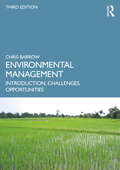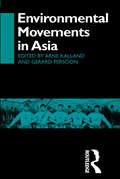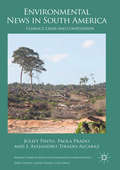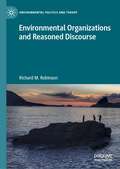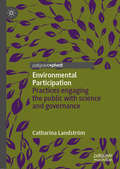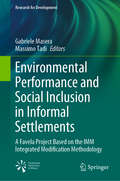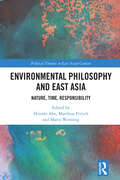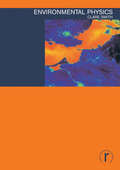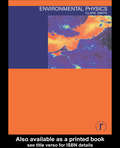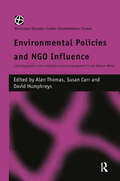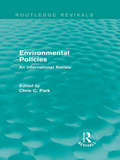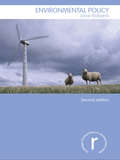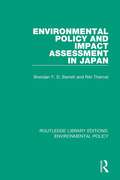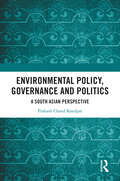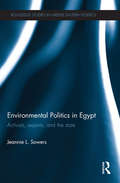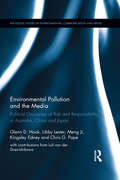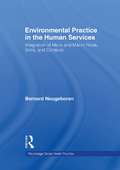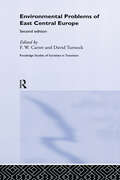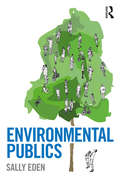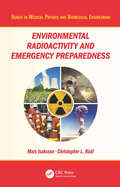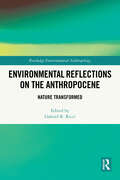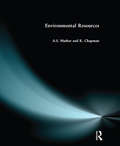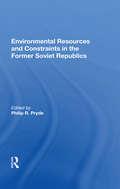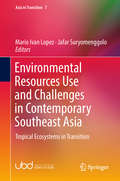- Table View
- List View
Environmental Management: Introduction, Challenges, Opportunities (Routledge Perspectives On Development Ser.)
by Chris BarrowThis comprehensively updated third edition explores the nature and role of environmental management and offers an introduction to this rapidly expanding and changing field. It focuses on challenges and opportunities, and core concepts including sustainable development. The book is divided into five parts: Part I (Introduction to Environmental Management): four introductory chapters cover the justification for environmental management, its theory, scope, goals and scientific background Part II (Practice): explores environmental management in economics, law and business and environmental management’s relation with environmentalism, international agreements and monitoring Part III (Global Challenges and Opportunities): examines resources, challenges and opportunities, both natural and human-caused or human-aggravated Part IV (Responses to Global Challenges and Opportunities): explores mitigation, vulnerability, resilience, adaptation and how technology, social change and politics affect responses to challenges Part V (The Future): the final chapter considers the way ahead for environmental management in the future. With its well-structured coverage, effective illustrations and foundation for further, more-focused interest, this book is easily accessible to all.It is an essential reference for undergraduates and postgraduates studying environmental management and sustainability, and an important resource for many students on courses including environmental science, environmental studies and human geography.
Environmental Migration in the Face of Emerging Risks: Historical Case Studies, New Paradigms and Future Directions
by Thomas Walker Victoria Kelly Jane McGaughey Gabrielle Machnik-KekesiThis book will provide a space for new and emergent research in environmental migration, particularly in the context of a world beginning to emerge from the grip of a debilitating public health crisis that kept many firmly rooted in place while displacing others internationally. With famines, vast wildfires, droughts, and record heatwaves uprooting human settlements internationally, research on migration in the face of emerging risks is all the more urgent. As Balsari, Dresser, & Leaning point out, “the wall-building, xenophobic, and insular” platforms of some global powers in their immigration and asylum policies, and the ever-increasing stresses placed on the natural world that continue to make sites of human settlement less and less hospitable, make research on this topic both very timely and much needed. This book will include numerous case studies, historical analyses, projections, models, and recommendations for both policy and future research directions. Contributions are drawn from academics and practitioners in this fertile interdisciplinary field of academic inquiry, and each one focuses on the intersection of population and environment studies, history, geography, law, diaspora studies, economics, public health, and sociology.This book is composed of five clear sections. The introductory section includes one chapter that presents an overview of the current landscape, the scope and objectives of the book, as well as its specific approach and the various themes. The concluding section is composed of one chapter that presents a global map of recent innovations drawing together some of the core themes discussed throughout the book. The concluding chapter synthesizes the challenges and opportunities presented, and the possible future directions that researchers, practitioners, and regulators could and should move towards.
Environmental Movements in Asia (NIAS Man and Nature in Asia #Vol. 4)
by Arne Kalland Gerard PersoonThis volume paints a general picture of the environmental situation in Asia, backing it up with several case studies.Two major points are made in this general picture. The first is that environmental campaigns in Asia tend to have a local focus; they react to very concrete problems in the immediate neighbourhood and as such usually people are engaged in a cause for practical rather than idealistic reasons. Such can be seen in case studies from the volume dealing with campaigns against logging and tree plantations, tourist facilities and factories and in support or defence of nature reserves. This pattern is in marked contrast to the profile of the most successful Western movements (in terms of fund-raising at least) for whom the focus is on perceived problems in distant parts of the world.The second point is evidence in several of the case studies in the volume, namely that environmental campaigns cannot be understood in terms of environmental issues alone. Rather, they should be regarded as a form of cultural critique and frequently are a form of political resistance in situations where open political action is too risky.
Environmental News in South America
by Juliet Pinto Paola Prado J. Alejandro Tirado-AlcarazCombining perspectives from media studies and political ecology, this book analyses socially constructed news regarding three environmental conflicts in South America. In recent decades, South American political administrations have tied national economies to neo-extractive development strategies, creating not only vulnerabilities to global commodity boom and bust pricing cycles, but also to conflict regarding environmental and cultural degradation from extraction activities. Environmental contestations among indigenous peoples, environmental and social NGOs, state actors, and extraction industries receive media attention, but how these disputes are covered has implications for understandings of media performance in democratizing nations. The authors examine three case studies of environmental contestation in a region that is simultaneously vulnerable to the effects of climate change, and yet has become once again dependent on commodity exportation to industrializing and industrialized nations for economic benefit and social development strategies.
Environmental Organizations and Reasoned Discourse (Environmental Politics and Theory)
by Richard M. RobinsonThis book explores the meaning and role of “fair and reasoned discourse” in the context of our institutions for environmental decision processes. The book reviews the roles of our “environmental advocacy organizations”—such as The Sierra Club, The Audubon Society, the Environmental Defense Fund—in providing and ensuring that our discourse and decisions are fair and reasoned according to the criteria of being (i) inclusive of input from all affected, (ii) informed of relevant scientific and socio-economic information, (iii) uncorrupted by direct conflicts of interest, and (iv) logical according robust review by uncorrupted judges. These organizations are described and examined as expressions of “collective imperfect duty,” i.e. the coordinated duties with environmental direction. The current state of our discourse is examined in light of this fairness criteria, particularly in consideration of the cross-border problems that threaten tragedies of the global commons.
Environmental Participation: Practices engaging the public with science and governance
by Catharina LandströmThis book introduces environmental participation as a distinct field comprising diverse practices. It presents examples of public participation specifically in environmental science, decision making and expertise. The first chapter introduces the science studies perspective and the key concepts that underpin the argument for approaching such a range of practices as a coherent field. The following three chapters explore a wide range of practical examples of how the public can participate in all three domains. Drawing on her experience with a variety of transdisciplinary projects Landström discusses topics including the coproduction of knowledge about flooding, community involvement with radioactive waste disposal and collaborative water quality modelling. She then goes on to cover citizen science and social movement expertise as environmental participation practices. The concluding chapter reflects on the challenges as well as future opportunities of environmental participation. This book is aimed at readers from a variety of academic and non-academic backgrounds and will be a great interest to social and natural scientists, students and practitioners.
Environmental Performance and Social Inclusion in Informal Settlements: A Favela Project Based on the IMM Integrated Modification Methodology (Research for Development)
by Gabriele Masera Massimo TadiThis book discusses the potential of a systemic and multidisciplinary design approach to improve urban quality, health, livability, and inclusiveness for people living in informal settlements. In most instances, attempts to address informal settlements lack an adequate assessment of their impact on the wider built environment and implementation of the UN’s Sustainable Development Goals. The Integrated Modification Methodology (IMM), introduced here, offers a systematic, multidisciplinary design tool encompassing several of the aspects that define the environmental performance of urban systems. The book also demonstrates the application of the methodology to an informal settlement, proving its potential to guide systemicurban transformations, also in urban areas lacking formal planning. The case study investigated is in the Rocinha favela in Rio de Janeiro, which ischaracterized by poor water quality, lack of drainage and sanitation systems, and very few green spaces. Based on a rigorous methodology, the process described here can also be applied in similar contexts around the world.
Environmental Philosophy and East Asia: Nature, Time, Responsibility (Political Theories in East Asian Context)
by Matthias Fritsch Mario Wenning Hiroshi AbeThis book explores the contributions of East Asian traditions, particularly Buddhism and Daoism, to environmental philosophy in dialogue with European philosophy. It critically examines the conceptions of human responsibility toward nature and across time presented within these traditions.The volume rethinks human relationships to the natural world by focusing on three main themes: Daoist and Eurodaoist perspectives on nature, human responsibility toward nature, and Buddhist perspectives on life and nature. By way of discussing East Asian traditions and European thinkers, this collection reveals that the impact of humanity on the environment is shaped not only by distinctive modes of economic production, but also by cultural beliefs and practices. Representing a unique constellation of environmental and intercultural philosophy, the contributions present systematic approaches to the global need for cultivating environmental responsibility across cultures and generations to address the political, ethical, and aesthetic challenges arising from humanity’s transformative impact on the natural world.Presenting a critical re-evaluation of human relationships to the natural world in dialogue with East Asian traditions, this will be a valuable resource for students and scholars of Philosophy, Environmental Studies and Asian Studies.
Environmental Physics (Routledge Introductions To Environment: Environmental Science Ser.)
by Clare SmithFirst Published in 2002. Environmental Physics is a comprehensive introduction to the physical concepts underlying environmental science. The importance and relevance of physics is emphasised by its application to real environmental problems with a wide range of case studies. Applications included cover energy use and production, global climate, the physics of living things, radioactivity, environmental remote sensing, noise pollution and the physics of the Earth. The book makes the subject accessible to those with little physics background, keeping mathematical treatment straightforward. The text is lively and informative, and is supplemented by numerous illustrations, photos, tables of useful data, and a glossary of key terms.
Environmental Physics (Routledge Introductions to Environment: Environmental Science)
by Clare SmithEnvironmental Physics is a comprehensive introduction to the physical concepts underlying environmental science. The importance and relevance of physics is emphasised by its application to real environmental problems with a wide range of case studies. Applications included cover energy use and production, global climate, the physics of living things, radioactivity, environmental remote sensing, noise pollution and the physics of the Earth. The book makes the subject accessible to those with little physics background, keeping mathematical treatment straightforward. The text is lively and informative, and is supplemented by numerous illustrations, photos, tables of useful data, and a glossary of key terms.
Environmental Policies and NGO Influence: Land Degradation and Sustainable Resource Management in Sub-Saharan Africa (Routledge Research In Global Environmental Change Ser. #No.4)
by Alan Thomas, Susan Carr and David HumphreysThis book examines the conditions under which non-governmental organisations (NGOs) may exert influence on policies to conserve and sustainably use natural resources in sub-Saharan Africa. The book is unique in bringing together NGO campaigners in three African countries with academics specialising in development studies, systems and environmental policy.
Environmental Policies: An International Review (Routledge Revivals)
by Chris C. ParkThe importance of the effective management of the natural environment has become vital over the past few decades. In different countries, varying policies are implemented by governments to manage the environment, both to foster growth and reduce pollution and destruction. Employing a broad country-based approach, this edited collection, first published in 1986, surveys the growth, nature and effectiveness of the environmental management policies implemented by governments around the world. The overarching argument is that a coherent international approach is needed to deal with the problems surrounding environmental sustainability. This title will be of great value to students of the natural environment, sustainability and resource management.
Environmental Policy
by Jane RobertsEvidence of climate change, resource shortages and biodiversity loss is growing in significance year by year. This second edition of Environmental Policy explains how policy can respond and bring about greater sustainability in individual lifestyles, corporate strategies, national policies and international relations. The book discusses the interaction between environmental and human systems, proposing environmental policy as a way to steer human systems to function within environmental constraints. The second edition has been completely updated to reflect advances in scholarship (for example developments in governance theory) and the increasing primacy of climate policy within environmental policy as a whole. Key political, social and economic concepts are used to explain how effective environmental policies can be designed, implemented and evaluated. Environmental problems, the role of human beings in creating them and sustainable development are all introduced. Environmental policy formulation, implementation and evaluation are discussed within three specific contexts: the firm, the nation state and at an international level. The book reviews the relationship of economics, science and technology to environmental policy. It ends by reflecting upon the predicament of humankind in the twenty-first century and the potential of achieve sustainability through the use of the environmental policy ‘toolbox’. Environmental Policy is an accessible text with a multi-disciplinary perspective. Lively case studies drawn from a range of international examples – and completely updated for this second edition – illustrate issues such as climate change, international trade, tourism and human rights. It includes chapter summaries, suggestions for further reading and links to relevant web resources.
Environmental Policy and Impact Assessment in Japan (Routledge Library Editions: Environmental Policy #2)
by Riki Therivel Brendan F. BarrettFirst published in 1991. Japanese attitudes to pollution and environmental protection were distinctly equivocal. The Japanese are a nature-loving people, yet they are responsible for widespread environmental destruction; Japan has some of the world’s strictest environmental quality standards, but the country also has some of the world’s most environmentally damaged areas. In this book the authors present a broad and detailed analysis of policy and process in Japan in the late twentieth century. Brendan Barrett and Riki Therivel, who both have extensive research experience in Japan, describe interest group participation in Japan’s environmental policy-making and give an historical review of the relationship between economic growth and environmental problems. They look at the framework for environmental policy-making and outline the system for environmental management. This is complemented by a discussion of Environmental Impact Assessment, and by live case studies of the practical realities of EIA in Japan. With environmental problems reaching global proportions, countries all over the world have much to learn from the experience of Japan, and the book will be extremely useful to national government officials, to local planning officers responsible for EIA, and to environmental consultants working for commercial and industrial companies. It will also be essential reading for students of geography, environmental studies, Japanese studies and planning economics.
Environmental Policy, Governance and Politics: A South Asian Perspective
by Prakash Chand KandpalThis book traces the development-environment discourse in India and examines the multi-layered interaction between society and nature in the light of the role of the state, judiciary and the civil society. Through an array of perspectives, the volume challenges the conventional approach to understanding the environmental politics in South Asia without considering the role of the civil society and other informal actors, which has radically altered the conventional articulation of the phenomenon.The volume underlines distinct structural characteristics of developmental politics in India and the social concerns and challenges which come in the way of environmental policy and governance in India. It is a meaningful intervention in unearthing significant socio-political and economic processes which are critical to the environmental governance in India. The book will not only be helpful in studying the state of policy, administration and politics of environmental discourse in India, but also guide the policymakers to explore the sustainable ways of environmental governance in South Asia.Insightful and lucid, this book will be useful to the students, researchers and faculty working in the field of political science, public administration, public policy, political sociology, political economy and governance studies. It will also be an invaluable and interesting reading for those interested in South Asian studies.
Environmental Politics in Egypt: Activists, Experts and the State (Routledge Studies in Middle Eastern Politics)
by Jeannie SowersDrawing on extensive fieldwork conducted in Egypt from the late 1990s to 2011, this book shows how experts and activists used distinctive approaches to influence state and firm decision-making in three important environmental policy domains. These include; industrial pollution from large-scale industry, the conservation of threatened habitat, and water management of the irrigation system. These cases show how environmental networks sought to construct legal, discursive, and infrastructural forms of authority within the context of a fragmented state apparatus and a highly centralized political regime. ‘Managerial networks’, composed of environmental scientists, technocrats, and consultants, sought to create new legal regimes for environmental protection and to frame environmental concerns so that they would appeal to central decision-makers. Activist networks, in contrast, emerged where environmental pollution or exclusion from natural resources threatened local livelihoods and public health. These networks publicized their concerns and mobilized broader participation through the creative use of public space, media coverage, and strategic use of existing state-sanctioned organizations. With the increased popular mobilization of the 2000s, and the mass protests of the 2011 revolution, environmental politics has become highly topical. Expert and activist networks alike have sought to broaden their appeal and diversify their approaches. The result may well be a more contested, participatory, and dynamic phase in Egyptian environmentalism.
Environmental Pollution and the Media: Political Discourses of Risk and Responsibility in Australia, China and Japan (Routledge Studies in Environmental Communication and Media)
by Meng Ji Kingsley Edney Glenn D. Hook Chris G. Pope Libby Lester Luli van der Does-IshikawaThis book offers a theoretically informed empirical investigation of national media reporting and political discourse on environmental issues in Australia, China and Japan. It illuminates the risks, harms and responsibilities associated with climate change through an analysis of pollution, adopting an interdisciplinary approach drawing on both the social sciences and humanities. A particular strength of the work is the detailed analysis of the data using a range of both quantitative and qualitative techniques, enabling the authors to reveal in rich and compelling detail the complex relationship between risk and responsibility in the climate change discourse. The case studies of Australia, China and Japan are set in the current literature as well as in the historical context of climate change in these three countries. The analysis of the media discourse on the Great Barrier Reef in Australia demonstrates how the mining of coal for overseas markets has led to devastating harm to the life of the reef. A critical discussion of the Chinese documentary, Under the Dome, shows how this medium has played a crucial role in building awareness of the harm from atmospheric pollution among the citizens, shaping attitudes and promoting action. The first case study of Japan elucidates how cross-border atmospheric pollution from China forges a chain of responsibility for responding to climate change, running from the state to society. The other case study of Japan demonstrates how ‘smart cities’ have emerged as a way to mitigate the risks and harms of climate change. The Conclusion draws together the similarities and differences in how climate change is addressed in the three countries. In all, Environmental Pollution and the Media: Political Discourses of Risk and Responsibility in Australia, China and Japan uncovers the dynamics of the triadic relationship among risk, harm and climate change in Australia, China and Japan. By so doing, the book makes an original and timely contribution to understanding comparative media, discourse and political debates on climate change.
Environmental Practice in the Human Services: Integration of Micro and Macro Roles, Skills, and Contexts
by Bernard NeugeborenEnvironmental Practice in the Human Services points to the need for the human services to return to their historic mission of environmental change. It moves beyond the more general conceptual emphasis on person-in-environment toward the development of an environmental practice technology based on an intervention model which prescribes specific micro and macro roles and functions. It may open the way to recapturing the conceptual breadth which characterized the first 40 years of social work as a professional and occupational entity. The “ecological” perspective in social work has fostered an interest in the impact of social environments on service consumers. Environmental Practice in the Human Services tries to rectify the historical imbalance in the human services that has emphasized people-changing methods, giving secondary emphasis to environmental change. It instructs students preparing for practice in the human services, as well as agency practitioners, in the knowledge and skills necessary in environmental practice. Cases in environmental practice are used to illustrate how these skills are utilized in actual practice situations.The book&’s scope includes practice at the direct service, adminstration, planning, and social policy levels; it integrates micro and macro practice and shows how these two levels of practice are interdependent. This enables human service practitioners to create and/or modify social environments to enhance the functioning of clients being served in human service programs. Topics covered include: important skills in environmental practice, including decisionmaking, negotiating, and leadership community practice and resource coordination social support the impact of organizational environments on practice environmental practice for the chronically disabledAuthor Neugeboren&’s approach is unique in its in-depth focus on environmental practice, applying concepts of social environment to specific practice roles. This practice-specific content, which provides tools needed for environmental practice, is in contrast to existing texts on the social environment which are very theoretical and not integrated with practice. He includes material from the field of social ecology which has not been included in existing texts. It shows how practitioners and administrators, planners, and policymakers can facilitate and support each other&’s work.Reading Environmental Practice in the Human Services will enlighten students and practitioners with specific skills for impacting on different social environments to enhance client benefit. It tells how a direct service practitioner can determine which organizational environments are suitable for particular client needs in making agency referrals. It also provides administrators with information about designing, planning, and managing agencies with functional organizational environments which achieve effective services.
Environmental Problems in East-Central Europe (Routledge Studies of Societies in Transition #Vol. 18)
by David Turnock F. W. CarterIn this new edition, the progress made in the last decade to solve the environmental problems described in the first edition is assessed. The attempts to bring environmental legislation into line with West European norms is also described. Environmental Problems of East-Central Europe looks at air and water pollution, modern farming, water supplies, waste management and landscape protection. These topics are placed within economic, social and political profiles, as spending on a clean environment must be reconciled with welfare spending and the safeguarding of jobs, European Union assistance, civil society and the work of environmental NGOs are also discussed. All of these matters are considered within the context of the wider geographical area and then by each individual country, including the previously communist states lying to the west of the Soviet Union (now with the former federal states of Czechoslovakia and Yugoslavia broken up into seven different entities) and a review of the former Soviet Union with particular reference to the Baltic States. Environmental Problems in East-Central Europe provides a wealth of up-to-date reference material, with a vast amount of supporting literature on environmental conditions and the functioning of civil society and a map of each country. The environment is being taken seriously by them all, such is the influence of the Rio sustainability agenda in general and the EU environmental 'acquis' in particular. The book reveals that Eastern Europe is not a blighted area, but in some respects has a higher biodiversity than Western Europe. Although there is enormous waste and inefficiency in energy use, people actually consume relatively little and the East therefore has some lessons for the West in terms of managing on the bases of 'fair share' of the earth's resources.
Environmental Publics
by Sally EdenHow do ordinary people think about the environment as they go about their daily lives? Does thinking about the environment make them do things differently? This book is the first to explore the idea of ‘environmental publics’, that is, the ways in which ordinary people engage with environmental issues across different practical contexts of work, play and home. Emphasising the practices of ‘environmental engagement’, Environmental Publics examines how people consume the environment, learn about it, campaign for its protection and enjoy it through their leisure time. But the book avoids relying on idealisations of ‘consumers’ or ‘citizens’, or theoretical constructs about behavioural norms that have traditionally dominated research in this field. Instead, this book differentiates environmental publics not by who they are but by what they are doing – their daily practices. It also analyses specifically the geographies of those practices – how what people do affects the environment but in different ways across time and space and at different scales – aspects of practices that are neglected in the literature. With an interdisciplinary perspective, this book will be of interest to students and scholars in geography, sociology, science and technology studies, political science and anthropology. It is written in an accessible and readable style, so as to be useful for preliminary and more advanced courses in environmental management, perception and policy, as well as in studies of modern society, consumption and environmentalism.
Environmental Radioactivity and Emergency Preparedness (Series in Medical Physics and Biomedical Engineering)
by Mats Isaksson Christopher L. RaafRadioactive sources such as nuclear power installations can pose a great threat to both humans and our environment. How do we measure, model and regulate such threats? Environmental Radioactivity and Emergency Preparedness addresses these topical questions and aims to plug the gap in the lack of comprehensive literature in this field. The book explores how to deal with the threats posed by different radiological sources, including those that are lost or hidden, and the issues posed by the use of such sources. It presents measurement methods and approaches to model and quantify the extent of threat, and also presents strategies for emergency preparedness, such as strategies for first-responders and radiological triage in case an accident should happen. Containing the latest recommendations and procedures from bodies such as the IAEA, this book is an essential reference for both students and academicians studying radiation safety, as well as for radiation protection experts in public bodies or in the industry.
Environmental Reflections on the Anthropocene: Nature Transformed (Routledge Environmental Anthropology)
by Gabriel R. RicciIncorporating the intellectual history of disciplines from across the humanities, including environmental anthropology, philosophy, ethics, literature, history, science and technology studies, this volume provides a select orientation to the experience of nature from the ancient world to the Anthropocene.Taking its momentum from the emerging environmental humanities, this collection integrates Western, Indigenous, postcolonial, feminist and eco-spiritual perspectives that address pressing environmental concerns and reimagine the place of humans within the natural world. Across thirteen chapters, the contributors discuss the blending of environmental concerns with political and moral questions and encourage collaborative methods across disciplines to address dialectical tensions between culture and nature. They draw on a wide range of critical perspectives, provide a historical framework and speak to global environmental pressures from multiple standpoints. The global approach adopted throughout highlights the various realities of the growing ecological crisis experienced across the world. Written to appeal to a broad range of readers across the environmental humanities, this edited book will be particularly useful to academics, scholars and researchers in philosophy, anthropology, literature, history and critical theory.
Environmental Resources
by A.S. Mather K. ChapmanEnvironmental Resources provides a comprehensive text for undergraduate resource management courses. It begins with an introduction to natural and environmental resources and then considers them in the context of politics, time and space.
Environmental Resources And Constraints In The Former Soviet Republics
by Philip PrydeThe rapid changes in the former Soviet Union have rendered most pre-1992 works on its environment obsolete. A more specifically geographic approach that highlights the particular situation in each republic and region is offered by Philip R. Pryde’s new work, Environmental Resources and Constraints in the Former Soviet Republics. Focusing bro
Environmental Resources Use and Challenges in Contemporary Southeast Asia: Tropical Ecosystems In Transition (Asia in Transition #7)
by Mario Ivan Lopez Jafar SuryomenggoloThis edited volume introduces dynamic approaches to the study of Southeast Asia’s environmental diversity from different disciplinary perspectives at the interface between the natural and social sciences. It brings together research on the region’s environmental resource use and shared ecological challenges in the context of present day globalization to offer insights for possible future directions. The book introduces unique approaches to the study of Southeast Asia’s environmental changes and resource management under the influence of intensifying economic change in the region. It also examines the slow erosion of Southeast Asia’s rich environment and addresses serious issues such as the decrease in biodiversity and tropical forests, and the degradation of peat lands. At the same time, it discusses the social issues that are tied to energy-dependent growth and have intensified over the last two decades. It also analyzes the new roadmaps being created to protect, conserve, and manage the environment. By investigating the many ecological issues surrounding us, the volume brings to light the constant struggles we face while trying to develop a more inclusive and equitable approach to natural resources governance. This volume is relevant for students, academics and researchers who have an interest in the Southeast Asian environment and the way in which we use and interact with it.
